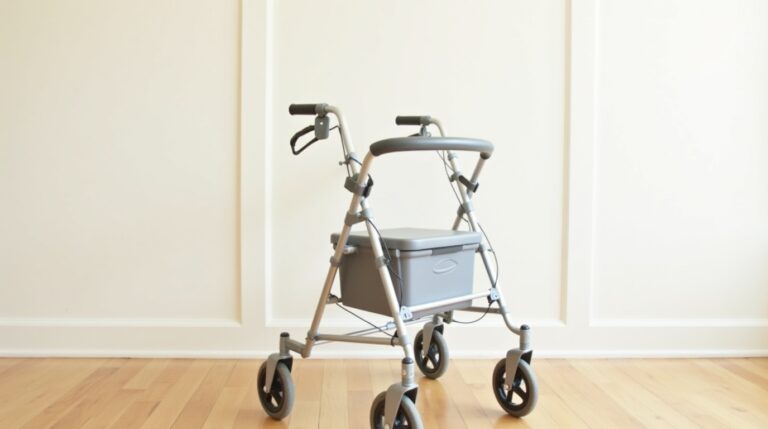Maintaining your independence while staying mobile is essential especially when mobility becomes more of a challenge due to age, injury, or health conditions. Folding walkers with wheels are game-changers for people who want both stability and flexibility in their daily lives. But here’s the truth: not all walkers are created equal and some might even hold you back if you don’t choose wisely.
This guide will walk (pun intended!) you through everything you need to know about picking a folding walker with wheels that actually keeps you moving, without compromise. From understanding key features to practical tips on choosing the right model for your lifestyle, we’ll help you make an informed decision that keeps you independent, comfortable, and active.
Why Folding Walkers With Wheels Are Worth It
Unlike standard walkers, which require lifting to move forward, walkers with wheels glide across the ground with ease. Add a folding mechanism to the mix, and you get a mobility aid that’s easy to store, transport, and maneuver—even in tight spaces.
These walkers are especially ideal for:
- People recovering from surgery or injury
- Seniors looking for added mobility without bulk
- Travelers who need lightweight, collapsible options
- Anyone who values independence and convenience
How a Poorly Chosen Walker Can Slow You Down
Ironically, a poorly designed walker can do the opposite of what it’s meant to—slow you down and reduce your confidence. Here’s how:
- Too heavy? It drains your energy.
- Too wide? You struggle to fit through doorways.
- No seat or storage? Now you’re juggling bags or can’t take breaks.
- Poor wheels? You end up dragging instead of gliding.
The key to avoiding this frustration is understanding your needs and knowing what features matter most.
1. Know Your Needs First
Before you even begin comparing brands or prices, take time to think through how and where you’ll be using your walker. Consider the following:
Indoor or Outdoor Use?
- Indoor: Look for a narrow walker with non-marking wheels and tight turning capability.
- Outdoor: You’ll need larger, more durable wheels that can handle uneven surfaces.
Mobility Level
- If you need light support, a three-wheeled walker may offer more speed and flexibility.
- For more stability, a four-wheeled folding walker with brakes and a seat will keep you safe and steady.
Strength and Endurance
- Do you need frequent rest stops? A built-in seat is essential.
- If lifting or folding is hard for you, look for models with simple, one-touch folding mechanisms and lightweight materials.
2. Key Features to Look For (And Why They Matter)
Let’s break down the components of a great folding walker with wheels—and how each can affect your mobility and comfort:
Wheels
- Front-wheeled walkers: These usually have two wheels in front and rubber tips in the back. Good for balance but still requires lifting slightly.
- Four-wheeled walkers (rollators): Great for active users, they offer speed and full-time rolling mobility.
Look for 6-inch or larger wheels for outdoor use, and swivel front wheels for better maneuverability.
Folding Mechanism
Choose a walker that folds easily with one hand, especially if you’ll be traveling or storing it frequently. Some even fold like umbrellas or collapse side-to-side, making them incredibly compact.
Braking System
- Loop brakes (like bike brakes) are most common and effective.
- Look for easy-to-lock rear brakes for safety while seated or parked.
Height Adjustability
A good walker should let you adjust the handle height so your elbows bend slightly (15–30 degrees) when you grip it. Incorrect height can lead to posture issues or even falls.
Weight and Frame Material
- Aluminum frames are lightweight yet strong.
- Steel frames offer more durability but can be heavier.
Find a balance between weight and strength, especially if you’ll be lifting the walker in and out of a car.
Seat and Storage
- A padded seat is ideal for resting when needed.
- Built-in storage compartments or under-seat baskets help carry essentials without adding bags that could affect balance.
3. Consider the Environment You’ll Use It In
Home Use
- Choose a narrow walker (around 22 inches or less) to navigate hallways and doorways.
- Non-marking wheels and quiet glides will prevent damage to floors.
Travel or Car Use
- Go for a lightweight model (under 15 pounds) that folds compactly to fit in a trunk.
- Look for one that doesn’t require tools to fold or adjust.
Rough Terrain or Outdoor Use
- You’ll need rugged tires, better suspension, and more durable frames.
- Some walkers even come with shock-absorbing wheels and cane holders.
4. Additional Comfort & Safety Features
Here are a few “nice-to-have” extras that can make a big difference:
- Ergonomic hand grips to reduce wrist strain.
- Reflective trim for visibility at night.
- Cup holders, cane clips, and tray accessories for daily convenience.
- Memory foam seats or breathable mesh backs for longer outings.
5. When to Choose a Rollator Over a Basic Folding Walker
The term rollator refers to a four-wheeled walker with brakes, a seat, and often storage. These are better suited for people who:
- Are more mobile and want to walk longer distances
- Need a portable resting place throughout the day
- Prefer smooth, rolling motion instead of lift-and-step movement
If your goal is to stay mobile without constant fatigue, a rollator is usually a better option than a basic two-wheeled walker.
6. Avoid These Common Mistakes
Too many people rush the process and end up with a walker that isn’t right for them. Avoid these pitfalls:
- Buying the cheapest option without checking specs
- Ignoring wheel size or material
- Skipping a trial walk before buying
- Forgetting about foldability if space is limited
- Choosing the wrong height (or not adjusting it!)
7. Best Brands and Where to Shop
While we’re not recommending specific products in this guide, you can find excellent folding walkers with wheels from brands like:
- Drive Medical
- Medline
- NOVA
- Hugo Mobility
- UPWalker (for upright-style walkers)
Shop from reputable medical supply stores or online platforms with strong return policies—because sometimes, the first walker isn’t the right one.
8. Insurance and Medicare Coverage
Did you know Medicare Part B may cover part of the cost of a walker if it’s prescribed by a doctor as medically necessary?
Make sure you:
- Get a written prescription from your healthcare provider
- Use a Medicare-enrolled supplier
- Confirm if your specific walker qualifies under their guidelines
Private insurance policies may also offer coverage, so check your benefits.
Conclusion
The right folding walker with wheels isn’t just a mobility device it’s a freedom enabler. It lets you keep pace with your life, not the other way around. Whether you’re grocery shopping, traveling, walking in the park, or simply moving from room to room at home, the right walker ensures you do it with safety, dignity, and confidence.




